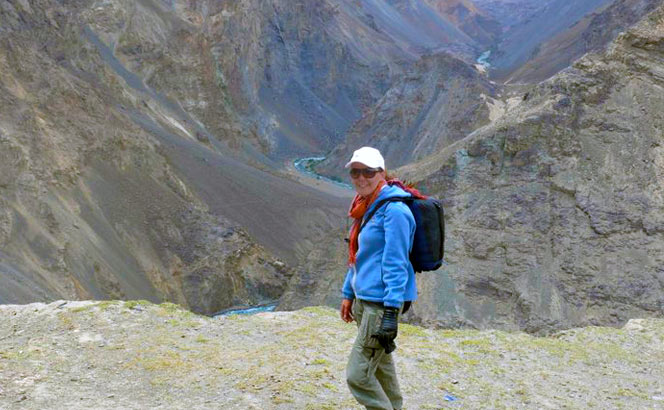A journey from the “roof of the world” to the mountains of Flagstaff ends in a familiar landscape and a culture that is a world away.
By choosing that path, international scholar Shodigul Mamadyorbekova has traveled from the High Pamir of Tajikistan to study at Northern Arizona University as part of the U.S. Department of State’s Edmund S. Muskie Graduate Fellowship Program.
The highly competitive Muskie program each year selects emerging leaders from 12 countries of the former Soviet Union to study in the United States. Mamadyorbekova, who goes by “Shodi,” was one of three students chosen from 230 applicants in Tajikistan.
At NAU, Shodi is studying in the environmental science and policy master’s program in the School of Earth Sciences and Environmental Sustainability. Her primary research interest lies in cross-boundary water management.
Much of central Asia continues to grapple with a water crisis, Shodi said. The long environmental shadow of the Aral Sea—often cited as a classic case of resource mismanagement—exemplifies the importance of water, along with oil and gas, as strategic resources in the region that could be used cooperatively for mutual gain.
“Resolving water conflicts can lead to better cooperation among countries,” Shodi said, which could assist with regional integration and open “new opportunities for the region to enter the world market.”
Because part of the Muskie program mission is for students to take training, knowledge and values back to their home countries, Shodi hopes to become involved in policy discussions in Tajikistan.
“Environmental aspects are not taken into account when policy decisions are made,” she said, citing water distribution as an example.
Shodi’s two-year fellowship will include an internship, which is yet to be determined, and has already presented her with an unanticipated challenge. Her fellowship acceptance occurred this spring in the midst of her marriage—a months-long, tradition-bound series of events. She hopes to be joined soon by her husband in Flagstaff, where she was placed by the Muskie program in a process that matches interests to academic programs.
“Life here is totally different,” Shodi said, “but I am really happy about the place match. If I don’t see mountains, I feel as if I am missing a part of me.”
After earning a bachelor’s in history and law from Khorog State University in 2007, Shodi attended a one-year English preparatory program to learn the language and become familiar with academic research and the requirements of western universities.
Soon after, Shodi became involved in a project focused on sustainable tourism development in the Alps and Pamirs.
The mountainous landscape of Tajikistan, situated just north of Afghanistan and south and west of four other former Soviet Republics, remained prominent in Shodi’s experiences as she transitioned to the Nature Protection Team, a Tajik non-governmental organization engaged in the community management of mountain ungulates.



